
France's High Commissioner to Tahiti is confronted by rumours of nuclear testing returning to the area.
Review by
Benjamin Poole
Directed by: Albert Serra
Starring: Benoît Magimel, Pahoa Mahagafana, Marc Susini, Matahi Pambrun, Alexandre Melo, Sergi
López

I'll tell you something about Pacifiction, big mouth auteur Albert Serra's (not a pejorative: I love big
mouth filmmakers) latest epic set within the political-cultural context of
the French Polynesian island of Tahiti: it doesn't half capture that
feeling of being on holiday by mistake. That creeping sense of being in an
unfamiliar, yet beautiful, location where you don't fit in, and, worse,
are surrounded by people elusive and strange; that out of sync sensation.
Such queasy alienation, of being a stranger in paradise, characterises
Serra's film. Reviews of Pacifiction have referred to the
film as Lynchian (used for once not as an idle adjective for "odd," more
as a fitting allusion to how both filmmakers have a way of centring on
something entirely quotidian and making it seem like the most significant
and beguiling thing on the planet), but the real influence here is the
great author JG Ballard, and his singular visions of gated communities and
luxurious spaces full of rich ex-pats and their deep seated ennui:
microcosms of lazy evil, listless sex and bored indulgence.

Tahiti is itself an estranged territory. Annexed from the other side of
the world by the French in 1880 with the existing culture long since
suffocated by missionaries, the languages spoken today are both French and
the indigenous Reo Tahiti, which has stubbornly refused to die following
governmental attempts at suppression. Predictably, wealth inequality is
acute in modern Tahiti too, which squares with the archipelago's history
of exploitation: a Chinese ancestry endures following the Cantonese who
were brought over as cheap plantation workers in the nineteenth century.
In Pacifiction, Artur Tort's photography duly picks out the deep waves, palm
trees and shimmering swimming pools which constitute the accepted
iconography of this tropical island, but, crucially, we view the landscape
subjectively: through windows, the cabin of a plane, as if the hazed
island is confining its populace of ex-pats and passers-through. In the
film's stand out sequence, we witness the dizzying sight of boats big and
small teetering on magnificently towering waves: a powerfully cinematic
experience wherein Serra renders the open space of paradise as sinister
and constricted.

Pacifiction's action returns throughout to a seedy night club where barely dressed
native staff serve lurid cocktails, bungs are shared, and mutually
advantageous relationships forged. Presiding over the convivial debauchery
is haut-commissaire De Roller (Benoît Magimel), glad-handing,
omniscient and half in love with the club choreographer Shannah (Pahoa Mahagafanau). It's not a bad life as De Roller swans about in a nice linen suit,
leching the young dancers who perform the Ori Tahiti for tourists (itself
a real-life bone of cultural contention, with the past powers that be
banning the dance's characteristically gluteal movements, which are
repurposed today as geegaw authenticity). Problem is that De Roller is not
only coming to the end of his tenure at the island and all the easy luxury
it entails, but also that as his office comes to a close there are
menacing signs that the French are planning to use the region for nuclear
testing. Sacrebleu!
Such plot points, however, are stretched out over a very languid 2 hours
and 45 minutes. As we follow De Roller executing the sort of seedy
business you'd expect a genial suit benefitting from bureaucratic
imperialism to be involved in, Pacifiction is perhaps not so
much a hang out movie but a hang-in-there movie. Half pressured by the
locals, half conscientiously, De Roller follows up the ominous appearance
of a submarine miles offshore. Yet, confronting a crocodile-smiling
official about the island's concerns, De Roller is just dismissively
promised tickets to a soon to open casino. Part of the film's domineering
ennui is the suggestion of De Roller's superfluity, of his empty
figurehead status upon the island as far as both the natives and the
authorities are concerned. Accordingly, the film insidiously affects a
disorientating aura of "derealisation," a feeling that if things are not
quite unreal, then they are empty, and completely without meaning or
excitement. In an astonishing sequence, a topless female DJ in an elevated
booth plays droning late night techno to a neon lit swimming pool and a
small audience of a man choking a sex worker, actions watched impassively
by De Roller from his balcony above (swimming pools and balconies: a
Ballardian lexicon).

On imdb trivia it reports that about 500 hours were shot during
Pacifiction's production, with Serra extoling that digital allows for an abundance
of footage to work with in post-production. This approach tallies with the
resultant mien of Pacifiction; moments occur here in louche intermittence whereas a sensation of
listlessness, a lack of defined purpose, defines the experience. Like that
bad holiday, I was relieved when it was over, but the strange atmosphere
and sinister ambience of Pacifiction proves as difficult to
shake off as jet lag.

Pacifiction is on MUBI UK now.

